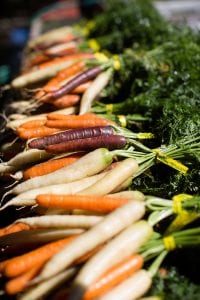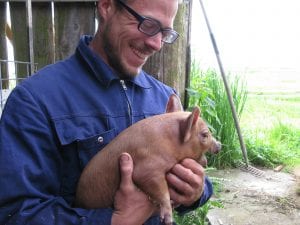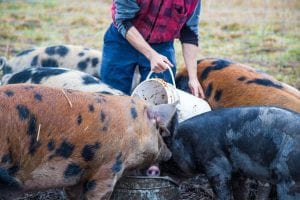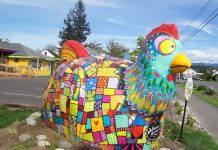Farming is equal parts challenging and rewarding. Hard work yields a bountiful harvest. The uncertainty of Mother Nature goes hand in hand with her majestic beauty. Perhaps the most difficult part is when financial stress takes its toll.
Fortunately, this is where Bellingham’s Community Food Co-op’s Farm Fund comes in. This program supports local farmers, providing funds and resources for those growing healthy food, using sustainable and organic farming practices.
Two Farm Fund beneficiaries are Spring Time Farm and Well Fed Farms, both devoted to growing healthy, ethically grown food. They each have their own unique stories.
Spring Time Farm
Spring Time Farm is an organic family farm in Everson, run by Nick Spring and Sarah Robinson. They’ve served Whatcom County, King County and Canada since 2014, with a focus on healthy vegetables, cut flowers and unique produce.

Spring cares for the vegetables, while Robinson tends flowers. They often join forces, however, working together on all parts of the farm.
Originally from Oregon, Spring ran an urban gardening system called the Bellingham Urban Growers Syndicate. Robinson grew up in Maryland and spent several years touring the Americas by bicycle. She’s also worked on farms in the United States and Turkey.
Spring Time Farm grows 60 species of vegetables in multiple varieties. Recently, they’ve added Italian and Japanese produce like radicchio, napa cabbage, and daikon radishes. Both are culinary traditions they grew up with, and Spring has farmed in Japan.
The Farm Fund helped Spring Time Farm in several ways, and the Co-op is one of their biggest purchasers. “They’ve always been extremely supportive, offering their services,” Spring says.
The Fund helped purchase garlic-processing equipment and property, something Spring is grateful for, as Whatcom farmland is expensive.

“It was a dream of ours to begin processing local garlic, mostly for restaurant use,” Spring says. “The bulk of [processed] garlic comes from China, so we wanted to provide a local, organic option.”
Spring and Robinson love being outdoors, growing food and being their own bosses. Problems still happen, though. Living factors, like soil and weather, can escape their control. But they make it work with a wide variety of crops, which Spring considers their insurance policy.
“If one thing doesn’t work out, we have two or three other things we can fall back on,” Spring says. “We really love growing food, seeing how much we can produce on such a small area of land, and trying to do it in a way that’s good for the environment, good for the people eating it, and works for our livelihood.”
Well Fed Farms
Well Fed Farms, in Bow, is a pasteurized livestock and organic crop farm and owner Erik Olson a first-generation farmer. The primarily Skagit-based farm began with the idea of “producing good food” and “meat and produce that is healthy, clean, delicious and grown with care.”

Olson is tremendously conscious of how he cares for his vegetables, chickens, pigs and the environment. He’s farmed full time for five years. He started in his early 20s, when he had the chance to work at a Seattle co-op grocery store, PCC. Later, working on a Wenatchee farm inspired him to start his own.
“The goal of the farm, among other goals, is to create a holistic business model,” Olson says. “The quintessential example is that by raising animals, we produce fertility that goes into producing the crops we sell.”
For example, land can get worn out from intensive farming, creating pest and disease problems. Olson avoids this with regular crop rotation. He grows vegetables in one spot for a few years, then grain, then pasture for his pigs and chickens to replenish the soil’s fertility and give disease and pest cycles time to break. This way, the soil is richer, healthier and more fertile when brought back into crop production.

“The Farm Fund has been incredibly helpful,” Olson says. “The Community Food Co-op puts their money where their mouth is in terms of supporting local agriculture and businesses that are trying to start up and grow into something that will be a sustaining part of the community long term. I believe they see the value of that investment.”
The money Olson received from the Co-op went toward purchasing new equipment, including tractor implements and a mechanical feeder that helps him grow on a larger scale to provide even more produce to local markets.
Farmers often wear many hats, and Olson keeps busy working as a crew manager, bookkeeper, marketer, researcher and more. That said, it’s fulfilling to be self-sufficient.

“It’s challenging, but that’s also part of the fun of it,” he says. “When you do that well, that’s the flipside: there’s a tremendous sense of accomplishment from doing such a complicated dance.”
Spring Time Farm products can be found at the Community Food Co-op, Bellingham Farmers Market and the Capitol Hill Broadway Farmers Market. Their produce is used at Acme Farms and Kitchen, Ciao Thyme, Cosmos Bistro, The Willows Inn, and more.
Well Fed Farms is at the Community Food Co-op, the Anacortes Farmers Market and Lake Forest Park Farmers Market. Their products are used at Breadfarm, Nell Thorn, Tweets, The Trainwreck Bar & Grill, Slough Foods and more.
Sponsored











































